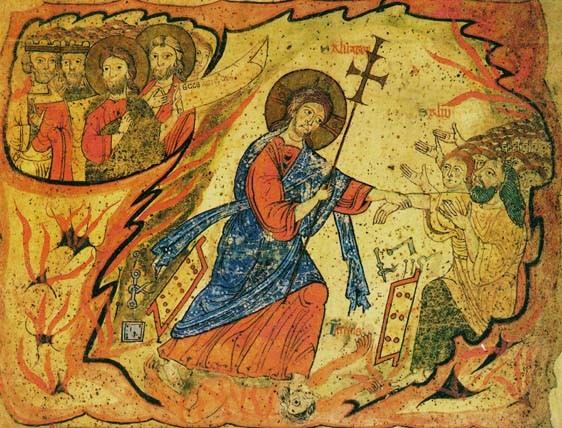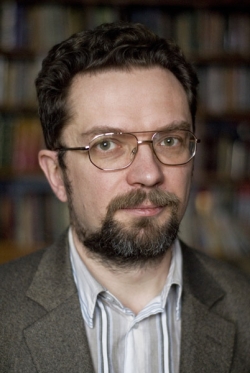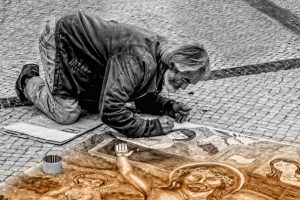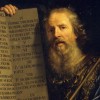In Matthew’s account of the crucifixion of Christ we encounter a strange episode not found in the other Gospels. Immediately following the Savior’s death, the graves were opened; and many bodies of the saints which slept arose, And came out of the graves after His resurrection, and went into the holy city, and appeared unto many (27:52-43). This sounds like a great miracle. Why, then, does only Matthew mention it, and only in passing? Who were these people and why did they rise from the dead?
First of all, take note that in Matthew this is not the only striking event that accompanied the death of Christ. Simultaneously, there was an earthquake and the veil of the Temple, which separated the Holy of Holies from the rest of the Temple, was rent. The veil was something of a symbol of the impermeable barrier between God and people: only the High Priest could pass through it – and only once a year, during a special ritual. Mark also mentions it; both he and Luke also speak of the Roman centurion who called Christ the Son of God immediately following His death. Which is more important: the words of a single centurion spoken to another Gentile (he might not even have invested the same meaning as we do into the words “the Son of God”) or the resurrection of many bodies of the saints which slept? The resurrection, of course, is more important – but only Matthew mentions this detail.
We must admit that we do not know anything about these people, either who they were or why they in particular, and not others, were raised. All four Gospels relate only a small selection of the events that occurred with and around Christ, choosing only the most significant; moreover, each of the Evangelists had his own purpose and scope. This episode once again reminds us of how little we actually know.
Matthew wrote primarily for the Jews, selecting those episodes of Gospel history that were especially meaningful for them, that they could understand without discussion or explanation. But the confession of the Roman centurion, the first by a Gentile, was meaningful to everyone. First, many Jews would have remembered the prophecy of Ezekiel: Behold, O My people, I will open your graves, and cause you to come up out of your graves, and bring you into the land of Israel. And ye shall know that I am the Lord (37:12-13). After all, the “saints” in the Bible are not special people who achieved exceptional success in asceticism and good deeds, but the entire people of God chosen for His service.
But it was more than just prophecies. The Israelites spoke of God’s intervention in their lives along these lines: “The Lord hath visited His people.” It is no accident that there are so many accounts in the Gospel of healings, the casting out of demons, and even of the raising of the dead. True, many more people fell sick and died than were helped by Christ, and even those who were healed were not promised an eternal and untroubled earthly life. But if the Lord is visiting His people, then there is no room for sorrow, sickness, and death – just as there can be no darkness in bright sunlight. For the Lord is the God of Abraham, Isaac, and Jacob; not of the dead, but of the living (cf. Matthew 22:32), and this connection between the Lord and His people is not severed beyond the boundary of this earthly life.
The return of these people to life even before Christ’s own Resurrection clearly demonstrated to Jewish readers that Christ’s death on the Cross did not amount to the failure of Him Who appeared to be the Messiah, but could not defeat the Romans. To the contrary, it became the central event of the visit from on high for which the entire Jewish people had waited so long. This meant that the “Day of the Lord” had arrived, when everything changes and the impenetrable barriers cease to exist – even between the dead and the living – and all become one before God.
The renting of the veil in the Temple signifies the same thing: the removal of the insurmountable barriers between God and people; similarly, the centurion’s confession represented the collapse of the wall standing between the Jews, who believed in the One God, and the Gentiles, who worshiped a multitude of gods. The prophets had also foretold this, saying that the Jewish people, called to manifest faith in God in this world, would in the last times become a center of attraction for all Gentiles: In those days it shall come to pass, that ten men shall take hold out of all languages of the nations, even shall take hold of the skirt of him that is a Jew, saying, We will go with you: for we have heard that God is with you (Zechariah 8:23). These times have come, the Evangelist Matthew is clearly telling the Jews, and now is the time to act, the time to live up to your calling.
Why were the Romans and Greeks not told about this? In other words, why do Mark and Luke keep quiet about this? One might explain their silence in that they simply did not have any reliable information concerning those who arose from the dead: Mark wrote only about that which was most important and Luke was not a witness to these events, relying instead on the carefully selected testimonies of others. But one could offer another explanation: this account of the resurrection of many people would have only distracted Gentile readers from the main point. The purpose of the Gospel is not to impress the reader with a multitude of miracles, but rather to relate that which is most important about Christ, while being fully comprehensible to its readership. This is why the centurion’s confession was more appropriate for relating than the account of the resurrection of the dead.
What does this account remind us of today? Needless to say, it reminds us of Christ’s victory over death and His descent into hades, which had become necessary to free many of its captives (although this descent is not normally associated with the resurrection of the dead). But this is not the only thing about which it speaks, if we call to mind Matthew’s first readers. Today people talk about Jesus of Nazareth in different ways. Some see Him as a great preacher or even prophet who, unfortunately, was rejected by His contemporaries and therefore perished tragically. Others, to the contrary, emphasize the significance of His death and Resurrection, yet all the while “sundering” Him from the Old Testament and the history of the Israelite people.
Matthew’s account of the renting of the veil, the raising of the dead, and the confession of the centurion clearly show us that Christ’s ministry was the continuation of the Old Testament and the fulfillment of prophecy: His death on the Cross, followed by the Resurrection, was neither a mistake nor an accident, but victory over death and the main event of His ministry and of the history of both Israel and of all mankind. Thus have Christians believed from the very beginning.
Translated from the Russian





















